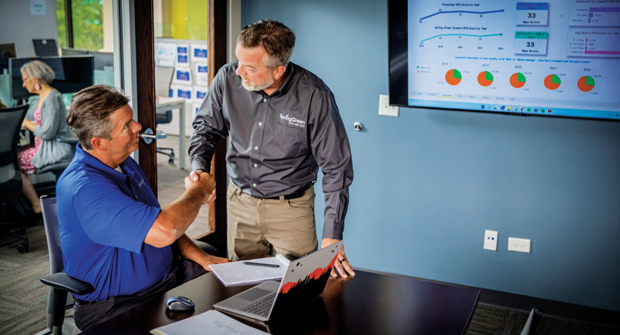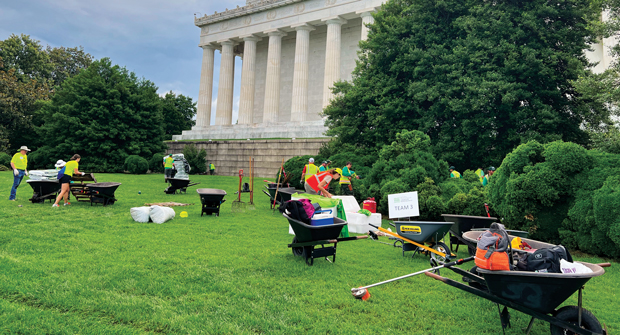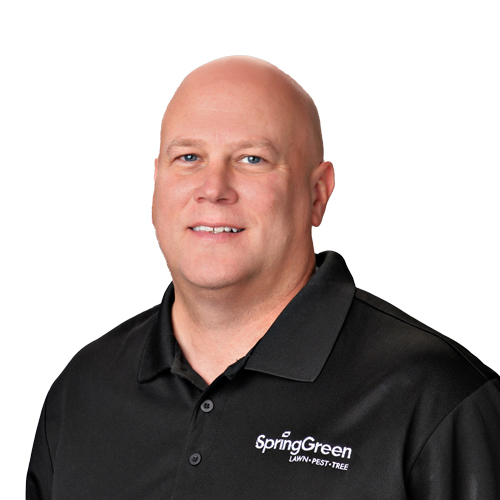
James Young
COO, Spring Green
‘Why are you getting into the business to begin with, what is the desired outcome and how hard do you want to work at it?’
Many of our owners are already entrepreneurs in the green industry. Nothing keeps them from getting into the residential lawn care and pest control business. When they look at Spring Green they are seeking a few things;
Diversification/wealth building — how do they leverage what they have without taking their eye off the current business and build a recurring revenue business that can be transferred to family or sold in the future?
They don’t want to reinvent the wheel — time is now valuable, so an industry franchise that can pair with their existing business makes sense. The marketing ecosystem for residential marketing is evolving daily and the cost and time to create and manage a marketing program seems ambitious. Leveraging Spring Green’s marketing service team — who does it for you planning through execution and utilizing the contact center to handle the volume of spring sales calls just makes sense.
Knowledge is power — At a certain stage of business ownership, you begin seeing the value of being part of something bigger and getting access to other like-minded owners who deal with the same day-to-day challenges and those that have similar aspirations for the why and what they are building. The nature of a franchise organization is to leverage best practices and facilitate collective knowledge sharing. Spring Green goes a step further with its peer groups, national training events and business consultants who take their owners through an annual business and marketing planning process.

Josh Wise
CEO, GrassRoots Turf
You really have to make sure that you’re passionate about what you’re doing and you’re not buying a business because, ‘Oh, it’s going to make great money.’
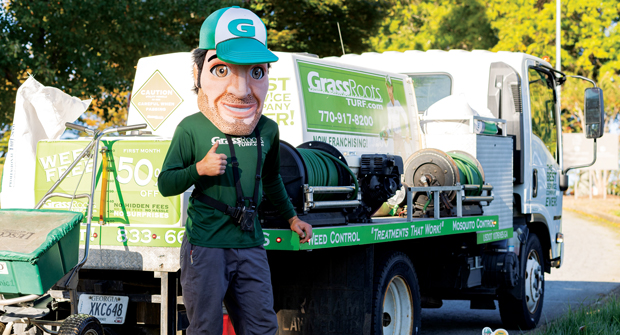
Obviously, we want to get into business to make good money and to have a good lifestyle, but if you’re just chasing the dollar and you’re not passionate about it, you’re not going to be that successful. I always want to make sure that first, there’s a passion for the green industry. They’re in a situation where they can devote the time that it’s going to take. A lot of potential business owners don’t realize the nights, the weekends, the long hours. There’s a lot that goes into making sure you’re successful.
A big challenge with potential franchisees that are starting up a business is they need to be able to follow systems. But they also need to not be afraid to question things. I think that’s what really makes a franchise system really good, is having the power of several different paths. Everybody that comes into the franchise system, they all come with some sort of background and everybody can bring something to the system to make it even more powerful. I encourage all of our franchisees to speak up, to challenge the systems, to try to figure out how can we get our cancellations rate a little bit lower and our retention higher.
If you’re looking at getting into a franchise, first you do a gut-check. You make sure that you’re really passionate about the business you’re looking at getting into and then you’ve got a support team around you. And then you should be successful with it.

Ken Hutcheson
President, U.S. Lawns
You have to look beyond the values and the tools, the systems and the processes (of a franchisor). Let’s look for one thing that I think that would create magic in their business. Are they passionate about the industry that they’re going to get involved in? Do they have a connection to the industry? Can they become passionate about it? Because if they don’t like dealing with commercial customers, they don’t like dealing with employees, if they don’t enjoy the landscape service or snow and ice business, it’s not going to work. It just isn’t.
This is not an absentee owner business or a simple investment. This requires involvement. Can you end up owning five or six units? Can you end up having general managers to where you’re not in the field? Oh, in a heartbeat. But going into it, they need to really sit back and ask, ‘Do I see myself in a service business?’
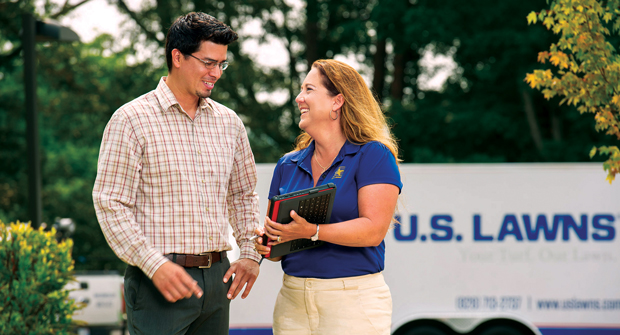

Rob Palmer
President, Lawn Squad
I’ll be as candid as I can be. I’ve been my own owner, I’ve been my own man for 23 years and I wasn’t sure about this franchising thing. I wondered is franchising the way to go?
What I realized was I would go to all these conferences. I’d go to the Landscape Management Growth Summit, I’d go to Elevate, the NALP’s conference, I’d go to the Ohio Turfgrass Conference. I was going on site visits to other lawn care companies throughout the country. At the same time, I’m using consultants. When I broke it all down, when I really got thinking about franchising, I’m thinking, well, I’m already seeking help. I’m trying to be part of a bigger organization to get information. That’s what a franchise is. It’s a whole ecosystem where we basically have our own peer group, we have our own entities, whether it’s a Lawn Squad in Boston or a Lawn Squad in Chicago or Lawn Squad in Georgia, we’re discussing best practices amongst ourselves.
We’ve created this entire ecosystem where with the backing and support of authority brands, we have marketing experts, we have sales experts, we’ve got folks that help you onboard your business, set up your bank accounts, get your insurance… We have negotiated rates with vendors on trucks and equipment. What I found out is while I wasn’t a franchise for the previous 23 years, I was paying consulting fees to folks to come in and help me. And really that’s what a franchise is.
You’re buying a business in a box, and of course, you’re paying a royalty, but it’s no different than hiring a consultant or attending these conferences on your own. I don’t look at that royalty rate as an expense to the business. I look at it as an investment in the business because of all the resources that come with the business.

Josh Sevick
Group President, Neighborly, The Grounds Guys and Lawn Pride
I’d encourage people to ask questions like, ‘Do we feel the need to create our own path?’ Some people are hyper-entrepreneurs, they don’t feel comfortable just executing and being successful — they have to do it their way. It’s not right or wrong, it’s just part of their entrepreneurial spirit. So, do you feel comfortable using someone else’s systems and processes? Is success making the bottom-line dollar for you, or is it building something that was part of your creative process? That’s a good question to test whether franchising might be right for you.
Another would be, ‘Do you want to be engaged in something for the foreseeable future, like a 10-year contract?’ When people are getting into contracts with a franchise organization, it’s usually a 5- to 10-year agreement. You’re hitching your wagon to a franchisor. You better trust them and want to coexist with them. If you don’t have the confidence that you want to be in that space for an indefinite period of time, franchising might not be the right fit for you.
